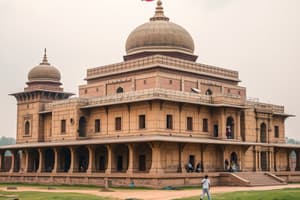Podcast
Questions and Answers
What is the primary focus of the 6th grade NCERT History curriculum?
What is the primary focus of the 6th grade NCERT History curriculum?
- Modern technological advancements and their impacts
- The evolution of economic theories throughout history
- The study of civilizations and their historical developments (correct)
- An exploration of scientific discoveries across ages
Which of the following aspects is NOT typically covered in the 6th-grade history syllabus?
Which of the following aspects is NOT typically covered in the 6th-grade history syllabus?
- The basics of economic systems (correct)
- The role of mythology in ancient cultures
- Famous historical leaders and their contributions
- Significant battles and wars in history
How do 6th-grade history lessons encourage critical thinking among students?
How do 6th-grade history lessons encourage critical thinking among students?
- By only discussing famous personalities in history
- By analyzing different perspectives on historical events (correct)
- By emphasizing rote learning of historical facts
- By memorizing dates and events
In 6th-grade history, students are likely to learn about which of the following early civilizations?
In 6th-grade history, students are likely to learn about which of the following early civilizations?
What is one method used in 6th-grade history classes to make the subject more engaging?
What is one method used in 6th-grade history classes to make the subject more engaging?
Flashcards
History
History
The study of past events, people, and societies.
People of the past
People of the past
The people who lived in a particular time period.
Historical sources
Historical sources
The sources used to learn about the past, such as written documents, artifacts, and oral traditions.
Historical research
Historical research
Signup and view all the flashcards
Important historical events
Important historical events
Signup and view all the flashcards
Study Notes
The Story of Our Past: A Journey Through Time (Chapter-wise Summary)
-
The chapters in Class 6th NCERT History focus on understanding the earliest human societies and the development of civilizations in different parts of the world, specifically across the Indian subcontinent.
-
The chapters primarily cover prehistoric and early historical periods, exploring various aspects like:
- Early human life and their settlements
- Development of agriculture and its impact on society
- Emergence of villages and towns
- Rise of early civilizations
- Interactions between different groups of people
-
The text emphasizes the following methodological aspects:
- Interpreting evidence from the past, such as archaeological remains and oral traditions
- Understanding the lives of people in the past
- Exploring continuity and change in different societies
- Recognizing the importance of different perspectives and interpretations
Key themes across chapters:
-
Early Human Communities: The chapters discuss how early humans adapted to their environment, developed tools and skills, and organized their lives. Focus is on the development of settlements and their interactions with their surroundings.
-
The Making of Villages and Towns: The transition from nomadic hunter-gatherer communities to settled agricultural societies (leading to villages and towns) is examined. The development of agriculture is emphasized as a crucial turning point and important factors like soil conditions, water sources and tools are covered.
-
Early Cities and Cultures: The chapters trace the development of early cities, including those in the Indian subcontinent, highlighting their growth and complexity, and the different social structures that emerged.
-
The significance of archaeology and oral traditions: The methods used by historians to understand the past, through archaeological evidence, ruins of settlements, and oral traditions (stories and legends), is discussed in detail.
Understanding Civilizations:
- The concept of "civilization" is explained, not as a single, unified phenomenon, but as a complex process with various characteristics that developed in different parts of the world independently.
- Examples of early civilizations may be briefly studied from the regions surrounding India.
Prehistoric Times:
The text provides information regarding the Stone Age, including its various phases, to illustrate how people in the past adapted to their environment and developed tools and technologies. The importance of tools and everyday life is also highlighted.
Early Historical Times:
- Early historical times in India involve interactions between different groups and their influence on shaping society.
- The concept of kings, rulers, and their roles in organizing communities is also introduced.
Social Organization in Early Societies:
- Descriptions of different social and gender roles in early societies – often based on evidence such as burial sites and artifacts – are discussed in many sections.
- Students learn about social inequalities by contrasting the lives of various communities during that period.
Focus on Evidence and Interpretation:
- Emphasis is placed on how we learn about the past through different types of evidence, such as material remains, oral tradition, and written documents. The limitations of these sources are also highlighted.
- Historical accounts are emphasized as not being absolute truths but rather interpretations of evidence from the past.
Important Skills and Concepts:
- Students develop critical thinking skills through analysis of different sources of information.
- They learn to understand the context of historical events and to form their own informed perspectives regarding various cultures.
Studying That Suits You
Use AI to generate personalized quizzes and flashcards to suit your learning preferences.




